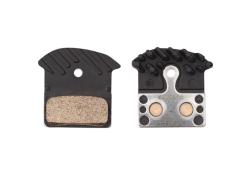Shimano N04C
154,70

Shimano L03A
From 111,10

Shimano L04C
From 133,30

Shimano N04C vs. Shimano L03A vs. Shimano L04C



This is what our customers think
Reviews
Pros
-
Good price (5x) |
Available! (5x) |
In stock (2x) |
Quiet (2x) |
Wear-resistant (2x) |
Durable (2x) |
Easy to install |
Valuable Component |
Cons
-
None (11x) |
expensive (2x) |
Pricey (2x) |
More expensive than third party pads |
Limited availability |
Noise in the rain |
No |
Pricey, but then you have something. |
According to the product specialist
Pros
| These brake pads are very suitable for use in mountainous areas and/or in muddy conditions. |
| These brake pads are very resistant to the heat generated by many brakes. |
| The metallic compound on this brake pad is very wear-resistant. |
| Heat dissipation is improved thanks to the cooling fins. |
| These organic brake pads produce very little noise. |
| These brake pads respond quickly and are easy to modulate. |
| With these brake pads you always have good braking power, regardless of the circumstances. |
| These brake pads are very wear-resistant. |
Cons
| These brake pads do not engage as quickly as pads with an organic compound. |
| These brake pads can make more noise during braking than pads with a softer compound. |
| Although heat dissipation is improved due to the cooling fins, these resin brake pads are more sensitive to heat than brake pads with a (semi-)metallic compound. |
| These brake pads are less responsive than softer pads and make more noise when braking. |
Specifications
Bike Type
Mountain bike
Road bike
Gravel bike
Gravel bike
Road bike
Gravel bike
Gravel bike
Hard (Metal)
Soft (Resin/Organic)
Hard (Metal)
Number of brake pads
1 Pair
1 Pair
2 Pairs
2 Pairs
1 Pair
2 Pairs
2 Pairs
Shimano B
Shimano G
Shimano G
 Nederland
Nederland België
België Deutschland
Deutschland United Kingdom
United Kingdom Finland
Finland Ireland
Ireland Luxembourg
Luxembourg Portugal
Portugal Poland
Poland Österreich
Österreich France
France España
España Italia
Italia Sverige
Sverige Danmark
Danmark









































































































































































































































